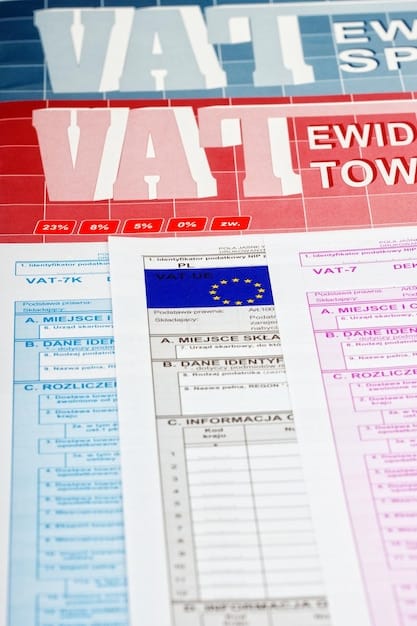Tax Planning for Rental Income: Landlord Deductions & Strategies in 2025

Tax planning for rental income in 2025 involves landlords employing strategic deductions, understanding evolving tax laws, and optimizing financial decisions to minimize tax liabilities and maximize profitability.
Navigating the complexities of taxation can be daunting for landlords. Efficient tax planning for rental income: deductions and strategies for landlords in 2025 is crucial for maximizing profitability and staying compliant with ever-changing tax laws. Let’s explore effective tax strategies that will help landlords minimize their tax burden and optimize their financial outcomes.
Understanding Rental Income Tax Basics
Before diving into specific deductions and strategies, it’s essential to understand the fundamental aspects of rental income taxation. This section provides an overview of what constitutes rental income and the basic principles that govern its taxation.
Taxable rental income typically includes all payments received from tenants, such as rent, advance rent, and any service charges. It’s also important to consider expenses related to managing and maintaining the rental property.
What Counts as Rental Income?
Rental income isn’t just the monthly rent payments. Here’s a breakdown:
- Rent Payments: This is the obvious one – the regular payments tenants make to live in your property.
- Advance Rent: Any rent paid in advance is also considered income in the year it’s received, regardless of which period it covers.
- Service Charges: Charges for services like laundry, cleaning, or maintenance are also part of your rental income.
Basic Tax Principles for Landlords
Several key principles guide the taxation of rental income:
- Accrual vs. Cash Basis: You can choose to report income and expenses based on when they are earned or received (cash basis) or when they are incurred (accrual basis). Most landlords use the cash basis.
- Deductible Expenses: You can deduct ordinary and necessary expenses related to your rental property. These deductions reduce your taxable income.
- Depreciation: This allows you to deduct a portion of the cost of your property each year, reflecting its wear and tear.

Understanding these basics sets the stage for effective tax planning. By accurately identifying rental income and being aware of the governing tax principles, landlords can better manage their tax obligations and optimize their financial outcomes.
Maximizing Deductions: A Comprehensive Guide
One of the most effective ways to reduce your tax liability as a landlord is by taking advantage of all eligible deductions. This section offers a comprehensive guide to maximizing these deductions, ensuring you claim every possible benefit.
Deductions can significantly lower your taxable income, and it is crucial to keep accurate records of all expenses related to your rental property.
Top Deductions for Rental Property Owners
Here are some of the most common and significant deductions:
- Mortgage Interest: You can deduct the interest you pay on your mortgage for the rental property.
- Property Taxes: The real estate taxes you pay are also deductible.
- Insurance: Premiums for property, liability, and other relevant insurance policies are deductible.
Less Obvious but Valuable Deductions
Beyond the common deductions, several less obvious ones can add up:
- Repairs and Maintenance: Costs for fixing and maintaining the property are deductible (but improvements are depreciated).
- Management Fees: If you hire a property manager, their fees are deductible.
- Travel Expenses: Costs incurred traveling to manage the property can be deducted, subject to certain limitations.
Strategies for Tracking and Claiming Deductions
Effective tracking is crucial for claiming all eligible deductions:
- Keep Detailed Records: Maintain receipts, invoices, and other documentation for all expenses.
- Use Accounting Software: Tools like QuickBooks or Xero can help you track income and expenses efficiently.
- Consult a Tax Professional: A tax advisor can help you identify all eligible deductions and ensure compliance.
Understanding Depreciation
Depreciation is a deduction that allows you to recover the cost of your rental property over its useful life. While it may seem complex, understanding depreciation can lead to significant tax savings.
The IRS allows landlords to depreciate the cost of the building (but not the land) over 27.5 years for residential rental properties.
Straight-Line Depreciation Method
The most common method for depreciating residential rental property is the straight-line method:
- Calculate the Depreciable Basis: This is typically the cost of the property minus the value of the land.
- Determine the Annual Depreciation Expense: Divide the depreciable basis by 27.5 (for residential properties).
- Claim the Deduction: Deduct the annual depreciation expense on your tax return.
Maximizing deductions is a vital component of effective tax planning. By understanding the range of available deductions, keeping accurate records, and potentially seeking professional advice, landlords can significantly reduce their tax liabilities and improve their financial outcomes.
Leveraging Tax-Advantaged Strategies
Beyond standard deductions, several tax-advantaged strategies can further optimize your tax situation as a landlord. This section explores strategies such as cost segregation, Qualified Opportunity Zones, and 1031 exchanges, offering insights into how these options can enhance your tax planning efforts.
These strategies often require careful planning and may involve specific eligibility requirements, so it’s important to be well-informed or seek professional guidance.
Cost Segregation
Cost segregation is a strategy that accelerates depreciation deductions by identifying and reclassifying property components with shorter tax lives. Instead of depreciating the entire building over 27.5 years, portions of it may qualify for faster depreciation.
This involves hiring a qualified professional to analyze the property and identify components that can be depreciated over shorter periods, such as 5, 7, or 15 years.
Qualified Opportunity Zones
Qualified Opportunity Zones (QOZs) are designated areas where investments can qualify for preferential tax treatment. Investing in QOZs can provide tax benefits, such as deferral or even elimination of capital gains taxes.
To take advantage of this, you invest capital gains into a Qualified Opportunity Fund (QOF) that, in turn, invests in businesses or properties within the QOZ.
1031 Exchanges
A 1031 exchange allows you to defer capital gains taxes when selling a rental property and reinvesting the proceeds into a like-kind property. This can be a powerful tool for building wealth without immediate tax consequences.
The properties must be of “like-kind,” meaning they are both real estate investments. There are specific rules and timelines you must follow to qualify for a 1031 exchange.

By leveraging tax-advantaged strategies like cost segregation, Qualified Opportunity Zones, and 1031 exchanges, landlords can significantly optimize their tax situation. These strategies, while complex, offer substantial benefits for those who plan carefully and understand the relevant rules and regulations.
Navigating the Qualified Business Income (QBI) Deduction
The Qualified Business Income (QBI) deduction is a significant tax break for many small business owners, including landlords. This section provides an overview of the QBI deduction and how it applies to rental income, along with tips for maximizing this benefit.
The QBI deduction allows eligible taxpayers to deduct up to 20% of their qualified business income, subject to certain limitations based on income level and the type of business.
Understanding the QBI Deduction for Landlords
For landlords, QBI generally includes rental income less deductible expenses. However, not all rental activities qualify as a business for QBI purposes.
- Rental Activity as a Business: To qualify for the QBI deduction, your rental activity must be considered a business, meaning you’re involved in regular and continuous management and operation.
- Safe Harbor Rules: The IRS provides safe harbor rules that, if met, ensure your rental activity is treated as a business for QBI purposes.
- Aggregation Rules: You may be able to aggregate multiple rental properties into a single business to meet the QBI requirements.
Strategies for Maximizing the QBI Deduction
To maximize the QBI deduction, landlords can consider the following strategies:
- Meet the Safe Harbor Requirements: Ensure your rental activities meet the IRS safe harbor rules to qualify for the QBI deduction.
- Track Time and Activities: Keep accurate records of the time and activities you spend managing and operating your rental properties.
- Consider the Impact of Income Levels: Be aware of the income limitations and how they may affect your QBI deduction.
Navigating the QBI deduction can be complex, but it is a valuable tax benefit for landlords. By understanding the eligibility requirements and implementing effective strategies, landlords can maximize this deduction and reduce their overall tax liability.
Common Tax Mistakes to Avoid
Even with careful tax planning, it’s easy to make mistakes that could lead to overpayment of taxes or even IRS scrutiny. This section highlights some common tax mistakes that landlords should avoid, along with tips for preventing these errors.
Avoiding these mistakes requires attention to detail, accurate record-keeping, and a solid understanding of tax rules and regulations.
Failing to Keep Accurate Records
One of the most common mistakes is failing to keep accurate and complete records of income and expenses.
- The Problem: Without proper documentation, you may miss out on valuable deductions or be unable to substantiate your claims if audited.
- The Solution: Maintain detailed records of all income and expenses, including receipts, invoices, and bank statements.
Improperly Classifying Expenses
Another frequent error is incorrectly classifying expenses, such as confusing repairs with improvements.
- The Problem: Repairs are generally deductible in the year they are incurred, while improvements must be depreciated over time.
- The Solution: Understand the difference between repairs and improvements and classify expenses accordingly.
Neglecting Depreciation
Many landlords overlook the depreciation deduction, which can result in significantly higher tax liabilities.
- The Problem: Failing to claim depreciation means you’re missing out on a valuable deduction that can lower your taxable income.
- The Solution: Calculate and claim depreciation each year, ensuring you’re taking full advantage of this deduction.
Ignoring Changes in Tax Law
Tax laws are constantly evolving, and ignoring these changes can lead to errors and missed opportunities.
- The Problem: New tax legislation can impact deductions, credits, and other tax benefits.
- The Solution: Stay informed about changes in tax law and consult with a tax professional to ensure compliance.
By avoiding these common tax mistakes, landlords can minimize their tax liabilities, reduce the risk of audit, and ensure they are taking full advantage of all available tax benefits. Diligence and attention to detail are key to successful tax planning.
Future-Proofing Your Tax Strategy for 2025 and Beyond
As we look ahead to 2025 and beyond, it’s essential to future-proof your tax strategy to adapt to evolving tax laws and maximize long-term financial benefits. This section offers insights into how to stay ahead of the curve and ensure your tax planning remains effective.
Future-proofing involves staying informed, seeking professional advice, and adapting your strategy as needed to navigate the changing tax landscape.
Staying Informed About Tax Law Changes
Keeping up with changes in tax law is crucial for effective tax planning. This ensures you’re aware of new deductions, credits, and other tax benefits that may impact your rental income.
- Follow Reputable Sources: Subscribe to newsletters, blogs, and other resources from reputable tax professionals and organizations.
- Attend Tax Seminars and Webinars: Participate in seminars and webinars to stay informed about the latest tax law developments.
- Monitor IRS Publications: Regularly review IRS publications and guidance for updates and changes.
Working with a Qualified Tax Professional
Engaging a qualified tax professional can provide valuable guidance and support in navigating the complexities of tax planning.
- Expert Advice: A tax professional can offer expert advice tailored to your specific situation.
- Compliance Assurance: They can help ensure you’re compliant with all applicable tax laws and regulations.
- Proactive Strategies: A tax professional can help you develop proactive tax strategies to minimize your tax liabilities and maximize your financial outcomes.
Adapting Your Strategy as Needed
Flexibility is key to future-proofing your tax strategy. Be prepared to adapt your approach as needed to respond to changes in tax law, market conditions, and your personal circumstances.
- Regular Reviews: Conduct regular reviews of your tax strategy to identify areas for improvement.
- Consider Long-Term Goals: Align your tax planning with your long-term financial goals.
- Seek Ongoing Guidance: Maintain an ongoing relationship with a tax professional to ensure your strategy remains effective.
| Key Point | Brief Description |
|---|---|
| 💰 Maximize Deductions | Claim all eligible expenses like mortgage interest, property taxes, and repairs. |
| 🏢 Depreciation | Deduct a portion of the property’s cost over 27.5 years for residential rentals. |
| 📚 QBI Deduction | Deduct up to 20% of qualified business income from rental activities. |
| 📝 Accurate Records | Keep detailed records of all income and expenses for tax purposes. |
FAQ
▼
Rental income includes rent payments, advance rent, security deposits (if not returned), and any services tenants pay for, such as laundry or maintenance fees.
▼
You can deduct ordinary and necessary expenses like mortgage interest, property taxes, insurance, repairs, maintenance, management fees, and depreciation to reduce rental income.
▼
Depreciation allows you to deduct a portion of your property’s cost over 27.5 years for residential rentals, reflecting wear and tear. Land value is not depreciable.
▼
The QBI deduction allows eligible landlords to deduct up to 20% of their qualified rental income, subject to certain limitations and requirements.
▼
Keep detailed records, classify expenses correctly, claim depreciation, and stay informed about tax law changes to avoid costly errors when filling out your tax returns.
Conclusion
Effective tax planning for rental income: deductions and strategies for landlords in 2025 requires careful attention to detail, a solid understanding of tax laws, and proactive strategies to minimize tax liabilities. By maximizing deductions, leveraging tax-advantaged strategies, and staying informed about changes in tax law, landlords can optimize their financial outcomes and achieve long-term success in the rental property market.





